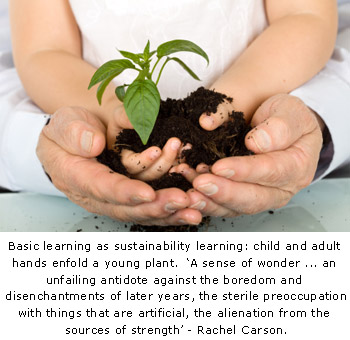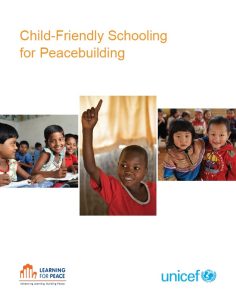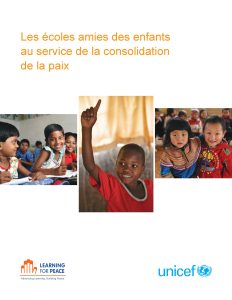There has been relatively little theoretical and practical exploration of the inter-relationship between sustainability-related education and basic education or its sub-sets, life skills education, child’s rights education, child-friendly learning and girls’ education, as developed by UN organizations and (international) non-governmental organizations.
 Members of Sustainability Frontiers, working together with partner organizations, are continuing their longstanding consultancy work in the basic education field while integrating sustainability concepts, knowledge, skills, values and dispositions into their development of curricula and associated pedagogies as they work with local educators. Action research into how well the ‘educations’ combine in practice within learning settings, formal and non-formal, is ongoing.
Members of Sustainability Frontiers, working together with partner organizations, are continuing their longstanding consultancy work in the basic education field while integrating sustainability concepts, knowledge, skills, values and dispositions into their development of curricula and associated pedagogies as they work with local educators. Action research into how well the ‘educations’ combine in practice within learning settings, formal and non-formal, is ongoing.
Equitable and quality education calls for the removal of barriers to the fulfilment of human potential created by attitudes, myths and prejudices, bounded and inflexible thinking, rigid national and sub-national educational policies and practice, poverty, inequality and the marginalization and oppression of peoples, and lack of physical, emotional and environmental security. Embedded in the idea of equitable and quality education and indeed at the heart of sustainability and child-friendly learning goals, is the concept of inclusivity. Educational inclusion is, of course, about achieving access to learning but it is as much about the learner encountering an affirmative and conducive learning context and climate underpinned by supportive institutional and systemwide policies, structures and practices. Community adoption of an inclusive value system is also vital so that communities set about rethinking and transforming the ways they organize themselves, the ways they relate and the ways they see the world so as to better meet the needs of children.
With regard to children with disabilities, Sustainability Frontiers affirms its commitment to the social model of disability that focuses on releasing the potential of the child and fostering active social participation by dismantling attitudinal, structural, policy and practice-linked barriers inhibitive to those with impairment, while fostering an enabling environment. There is no sustainability without full inclusion.
Projects/Consultancies
- West and Central Africa Life Skills Consultancy (2020)
- UNICEF Moldova Inclusive Education Consultancy (2016-2017)
- West African Psychosocial Support in the Classroom Consultancy (2015)
- Education in Emergencies Inclusive Education Consultancy for Save the Children Myanmar (2015)
- UNICEF Child-friendly Schools and Peacebuilding Consultancy (2013-2014)
Key Publications
- David Selby & Fumiyo Kagawa. (2014). Child-Friendly Schooling for Peacebuilding. UNICEF: New York. [In French click here]


